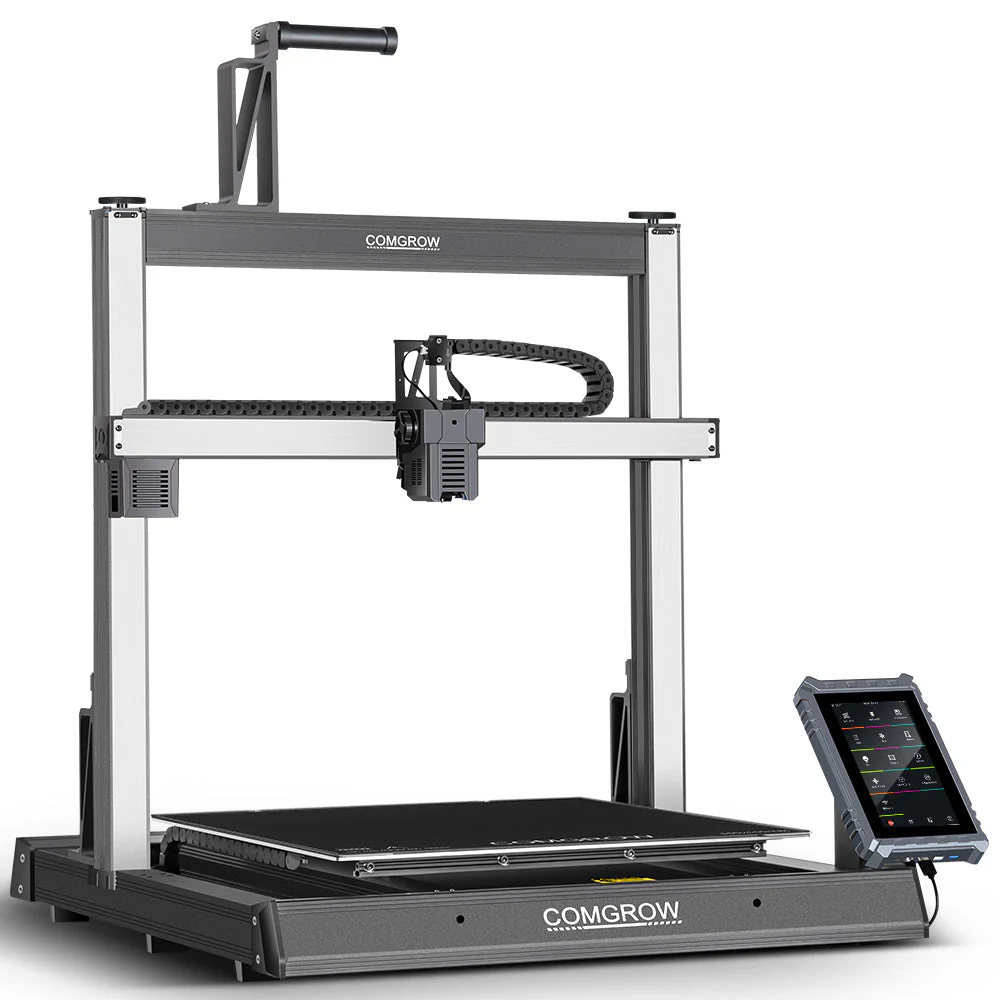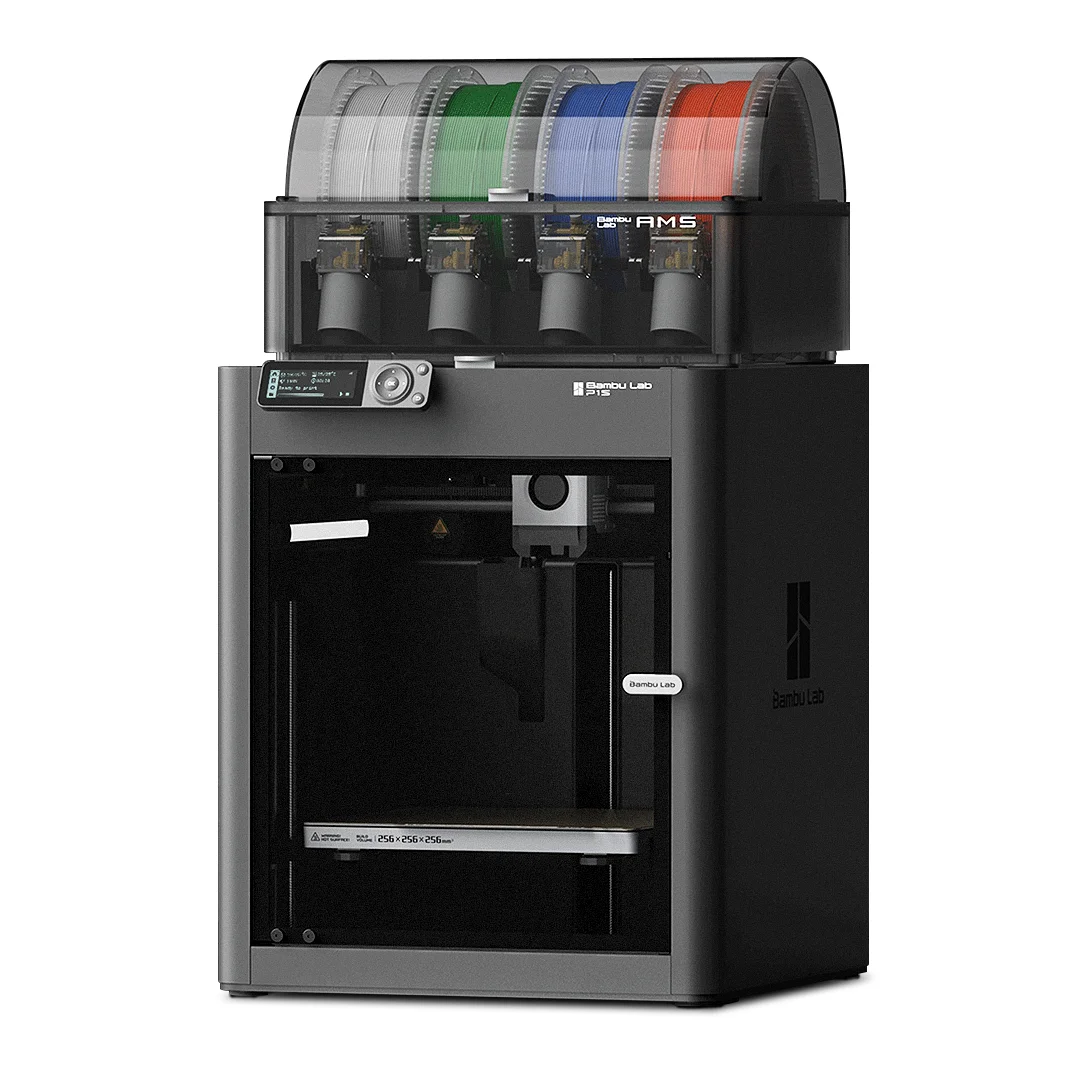Compare Comgrow T500 vs P1S
Comparison between the best 3D printers
Choose the best 3D printer at the best price. The cheapest 3D printers are here.
Buy a 3D printer here with 3D Fila.
 |
 |
|
| Model | Comgrow T500 |
P1S[BUY P1S] |
| Printing Material | Filament | Filament |
| Buy Filament for Sovol Comgrow T500 | Buy Filament forBambu Lab P1S | |
| Estimated price | $799,00 | $949,00 |
| Manufacturer | Sovol | Bambu Lab |
| Release Year | 2024 | 2023 |
| Print Volume [mm] | 500x500x500 | 256x256x256 |
| Printer Size [mm] | 817x810x962 | 389x389x458 |
| Weight [kg] | 39 | 12,95 |
| Power Loss Recovery | YES | YES |
| Enclosed printer | NO | YES |
| Bed Leveling | Automatic | Automatic |
| Filament End Sensor | YES | YES |
| Bed type | Heated | Heated |
| Power supply system | Direct Drive | Direct Drive |
| Standard nozzle | 0,4 | 0,4 |
| Maximum Nozzle Temperature [°C] | 300 | 300 |
| Maximum Bed Temperature [°C] | 80 | 100 |
| Maximum printing speed [mm/s] | 500 | 500 |
| Filament holder | YES | YES |
| Camera for supervision | NO | NO |
| Recommended filaments | PLA, PETG, Fibra de Carbono, TPU | PLA, PETG, TPU, PVA, PA, PA-CF, Nylon, PC |
| Recommended slicers | Creality Print, Cura 5.0 ou superior, Prusa Slicer, Orca | Bambu Studio, Super Slicer, Cura, Prusa Slicer, Orca |
| Maximum Resolution [mm] | 0,1 | 0,1 |
| Processor | Quad ARM A7 1.2 GHz | |
| Display | 7'' IPS touchscreen, 60Hz | Touchscreen 5'' |
| Power Supply | 500 W | 350 W |
| Connectivity | Wifi, Bambu bus, Cartão SD | |
| Operating systems | Windows, Linux, Macbook | |
| Date of registration in the system | 2024-07-18 | 2024-04-11 |
| Release date | 2024 | 2023 |
| Extra features | The Sovol Comgrow T500 stands out for its large print volume of 500x500x500 mm, ideal for large-scale projects. It has a direct extruder with a gear ratio of 6.5:1, speeds of up to 200 mm/s, and high-performance motors. The 7" touchscreen with Klipper software makes navigation easy. The 49-point automatic leveling ensures a perfect first layer. It also has a full metal hotend at 300°C, linear rails on all axes, and WiFi connectivity. | The Bambu Lab P1S stands out for its out-of-the-box practicality, eliminating the need for manual adjustments with automatic calibrations such as bed leveling and vibration compensation. It features multicolor printing capability through the AMS system, allowing up to 16 colors when connecting four AMS units. With an advanced control algorithm, the P1S offers fast printing speeds without sacrificing quality. Equipped with modern features such as filament end sensor, semi-automatic belt tension, direct extruder, welded frame and all-metal hotend, along with a fully enclosed chamber, the P1S promotes a superior printing experience, supporting a wide range of materials. |
| Support for multiple colors and materials (AMS and CFS) | NO | YES |
Notes * |
||
| Cost-benefit | 7 / 10 | 7 / 10 |
| Hardware | 3.6 / 10 | 6.4 / 10 |
| Tela | . | . |
| Print volume | 5 / 10 | 4 / 10 |
| Performance | 4 / 10 | 4 / 10 |
| [BUY P1S] |
Conclusion |
| In conclusion, the comparison between the Comgrow T500 and the Bambu Lab P1S reveals distinct advantages catered to different user preferences and needs in the realm of 3D printing. The Comgrow T500 offers a significantly larger print volume, making it ideal for large-scale projects. Its robust construction, high-performance motors, and advanced automatic leveling system ensure excellent print quality, especially for users focused on volume and material versatility. Additionally, the larger touchscreen and comprehensive software support enhance user experience. Conversely, the Bambu Lab P1S shines with its user-friendly features, making it highly approachable for beginners or those who prefer a plug-and-play experience. Its enclosed structure enhances safety and provides better temperature control, making it suitable for a wide range of materials. The added capabilities for multicolor printing and advanced calibration processes indicate a focus on both quality and innovation. While both printers receive similar cost-benefit ratings, the choice ultimately hinges on specific project requirements: for larger prints and diverse material use, the Comgrow T500 stands out; however, for ease of use and advanced features, the Bambu Lab P1S is a compelling option. Therefore, potential buyers should consider what aspects matter most—scale and material versatility versus user-friendliness and advanced features—before making a decision. |

